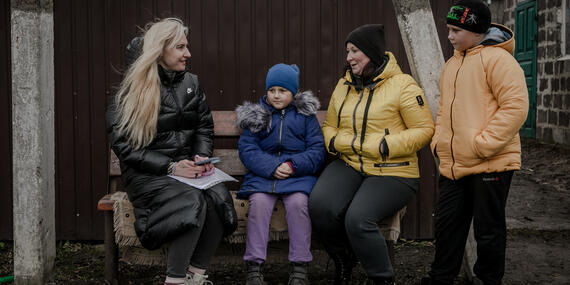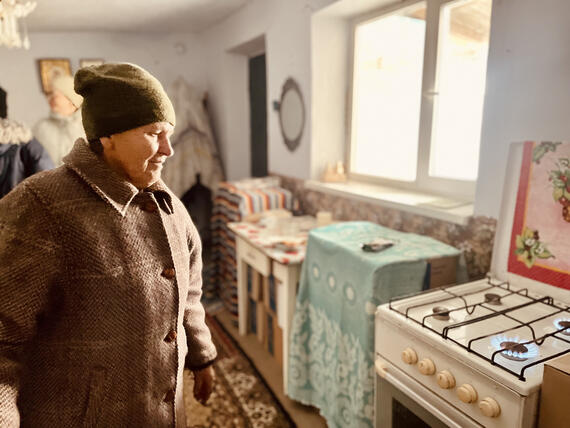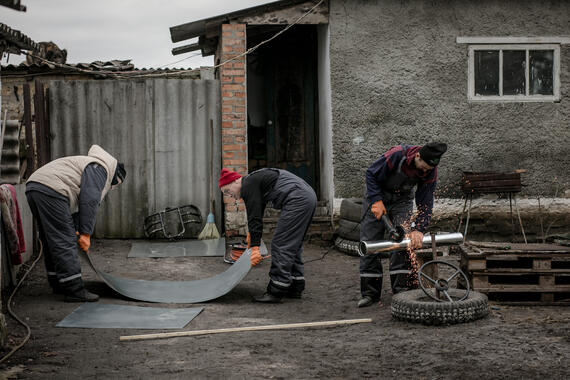Ukraine: Braving winter and air strikes to help people in need

By Nataliia Pushkaruk
With winter exacerbating Ukraine’s dire situation, humanitarian organizations are providing essential assistance with funding from the Ukraine Humanitarian Fund (UHF) and ensuring no one is left behind.
As Ukraine endures yet another harsh winter amid a new wave of attacks, humanitarian workers are tirelessly supporting the people most affected, especially in the cities, villages and towns of the country’s eastern and southern regions. Their efforts have been vital in reducing people’s suffering since the war escalated in February 2022.
One of these people is Antonina Veryovka, a 69-year-old resident of Pervomaiske village, in Ukraine’s Mykolaiv region. She shared her harrowing experience:
“Everything burned down completely. In my apartment, the walls were damaged. Windows, doors – everything was destroyed.”
Antonina's village was under Russian occupation for several days, and residents had to live in their basements for a long time.
Antonina was attempting to rebuild her life while still living in her severely damaged home. Her spirits remain unbroken. Fortunately, she received vital winter supplies – including a mattress, pillow and thermal blanket – from Caritas Czech Republic in Ukraine and the Ukrainian charitable foundation New Dawn, funded by the UHF.
"Now at least I have something to sleep on," she said gratefully.
Russia escalated its aerial attacks on 29 December 2023. Since then, nearly 3,000 Ukrainian families, including people living in cities close to the front line, have seen their homes damaged or destroyed. Millions of people have no electricity, water or heating due to targeted attacks on infrastructure. And the war's impact on Ukraine's economy has led to reduced incomes, exacerbating families’ struggle to afford daily essentials.
Humanitarian organizations are also helping Lidia and her family, from Oleksandrivka village, in Ukraine’s Kherson region. After fleeing but then returning to their war-affected village, Lidia and her husband couldn’t meet their basic needs to survive amid the brutal winter.

“We were so scared; it has been a nightmare,” she said. “There was so much shelling, we had to hide for so long in the basement, even with the children. And it got so bad we were forced to escape….”
With determination, resilience and hope, they are now striving to rebuild their lives. The Community Organized Relief Effort (CORE), an international humanitarian partner, played a crucial role in restoring gas access to their village. Lidia and her husband can now live in their house with at least basic comforts as they try to return to normal life.
Liana Khorovytska, Executive Director of CORE Response in Ukraine, said the organization provides comprehensive support to war-affected communities, and its goal is to create the conditions necessary to meet front-line residents’ basic needs.
She explained: “Since February 2022, we have been responding rapidly to requests for assistance in the front-line communities. For example, we helped restore the gas system in Oleksandrivka village, in Kherson Oblast, where nearly 500 villagers can finally spend the winter in warm homes after more than a year of interruption. We also provided firewood to 1,500 households in Donetsk Oblast.”
Liana added that for local people, firewood is not only a solution to keep their homes warm but also a way to cook hot meals.
In Zaporizhzhya Oblast, CORE is providing fuel briquettes to heat 2,000 households in settlements near the front line during the winter. And in Kharkiv, it is replacing windows in houses damaged by constant missile strikes.
Vira and her family are also receiving vital assistance. They live in Hontarivka village, just 39 km from the border with Russia, and face harsh realities. With no centralized gas supply, they rely on firewood for heating – a luxury that is becoming too expensive for many people. Frequent strikes in the region have made the search for basic warmth a significant challenge.
Vira shared a common challenge facing people affected by the war:
“Have you seen the prices for firewood? Where will we get the money if a truck of firewood costs UAH15,000 (US$400)?” she asked. “There is no gas, there is no anything.”

Families like Vira’s received vital assistance from Joint Emergency Response Ukraine (JERU), which is a collaboration of non-governmental organizations (NGOs), Welthungerhilfe and Concern Worldwide and the Ukrainian NGO, We are brothers. We are Ukrainians. They provided a stove and firewood, which brought hope, warmth and a lifeline in a time of great need.
JERU’s Country Director, Derya Mutlu, said: “Wherever we have been, winter has always been the biggest concern for people; whether they will have enough money for heating, whether families will be able to provide themselves with the necessary amount of firewood and fuel, heat their homes and pay unaffordable utility bills. That is why our winter projects are always aimed at meeting these essential needs.”
Since March 2022, JERU has provided winter assistance to more than 32,000 Ukrainians in remote areas of Kharkivska, Mykolaivska, Sumska and Zaporizka Oblasts, and to those people forced to leave their homes and settle in the relatively safe areas of Dnipropetrovska, Khmelnytska, Poltavska and Ternopilska Oblasts. Derya highlighted that they could not have responded to all these needs without their national partners, who work closely with small communities and are well aware of their most urgent needs.
He added: “During our visits to remote villages, we notice that people miss social interaction. Therefore, we see a great need for further psychosocial support, especially for older persons in rural areas. Due to the proximity to the front line or the Ukrainian-Russian border, children are forced to study online. Thus, sessions with psychologists are always a breath of fresh air for them. We believe that to reach long-lasting positive results, we need to work closely with our Ukrainian partners and share our capacities and experience with them.”
In 2023, humanitarian partners reached nearly 1.7 million people with winter assistance across Ukraine. Most of the people received assistance with shelter and other critical supplies in Kharkivska, Dnipropetrovska and Lvivska oblasts.
The Ukraine Humanitarian Fund (UHF) is a multi-donor pooled fund providing agile and flexible funding to support life-saving and life-sustaining assistance to war-affected people in Ukraine. In 2023, UHF allocated US$181 million, including $112 million through Reserve Allocations to support time-critical interventions including winter response and $69 million through a Standard Allocation to provide integrated multi-sectoral assistance to vulnerable war-affected people in rural front-line communities. Recognizing the critical role of local responders in delivering last-mile humanitarian assistance, especially in hard-to-reach areas close to the front lines, the UHF supports Ukrainian humanitarian organizations through both direct funding and sub-grants fostering meaningful local partnerships. In 2023, the UHF allocated $56 million to Ukrainian organizations, including $36 million directly to 13 national NGO partners. This accounted for more than 30 per cent of the total UHF allocations in 2023.
